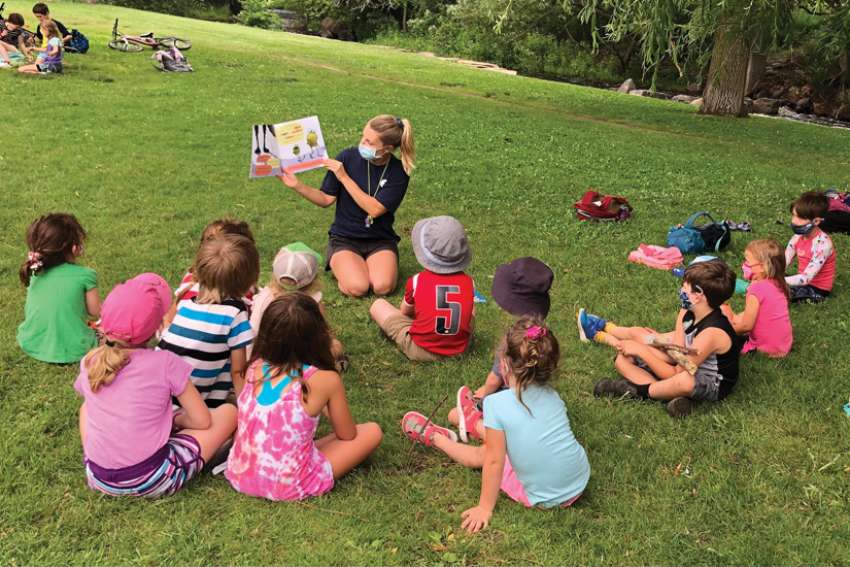On a sunny Wednesday morning in July, Corkery’s summer students are enjoying play by a creek in Jackson Park in Peterborough, Ont., and identifying species of invertebrates. A few children begin piling stones to create a dam. Working together in the creek to engineer the barrier, they troubleshoot their issues and their play goes on for another hour.
It’s that kind of spontaneous creative opportunity nature offers that Corkery says builds character in children, allowing them to grow into more empathetic, confident and resilient citizens.
“I would say my main objective is to get kids outside and to help them feel connected with nature,” said Corkery. “My main reason for being a teacher is to help kids develop those really important character traits that I think are necessary among stewards of the environment but also those who care about the world they live in.”
A Grade 6 and 7 teacher at St. Anne Catholic Elementary School in Peterborough, Corkery’s background in biology and environmental science coupled with her dedication to nurturing environmentally conscious children earned her the 2020 Learning For a Sustainable Future, Earth Steward Teaching Award. During the school year, Corkery dedicates an entire day each week with her students to outdoor learning, with a focus on teaching objectives across the full spectrum of curriculum.
“I’ve been pushing the boundary of what is OK to do in the classroom by taking kids outside more and figuring out ways to cover curriculum and assess (learning) in an alternative setting,” said Corkery. “It’s generating a lot of acceptance and other teachers around me are trying similar things as well because they see the kids buying into it.”
She had no plans to create a summer program, but an overwhelming demand from students and parents that prompted her to consider creating a summer camp version of her in-school nature programming. Particularly relevant in light of COVID-19 lockdowns that had students learning virtually for much of the school year, Corkery launched the Gritty Classroom in summer 2020. Several teachers at the school were inspired to adopt a similar teaching model. Four of those teachers were brought on
to help with the summer program which is thriving in its second year.
Given the climate crisis, Corkery says it’s important for children to understand the ripple effect human behaviour has on the natural world. By building a connection to nature at an early age, through science, young students are able to understand how human-induced emissions contribute to large-scale shifts in weather patterns. Driven by the Catholic teaching objectives highlighted in Pope Francis’ encyclical Fratelli Tutti, which stresses the care for ourselves and our natural world, Corkery says being good stewards of the environment is one of the ways students can put their faith in action.
“Pope Francis has made it really clear that we need to be prioritizing the natural world to care for our common home,” said Corkery. “We are in a climate crisis and we need to be prioritizing innovation around clean energy. We need to be prioritizing accessible food and water and clean resources for everybody in the world, including our poorest citizens. I think that this kind of outdoor learning helps to prepare kids for that.”
Mary-Claire Buell enrolled her kindergarten-age son in the summer program and says she’s noticed an increase in his overall well-being.
“He’s so excited to go every day,” said Buell, whose son Hudson also attends St. Anne. “He’s exhausted when he comes home, in a good way, and he just sleeps so well. He’s just so thrilled with life and instead of him sort of defaulting to his (gadget) screen, he’s just keeping that energy from camp going in his home life.”
Inspired by a fourth-grade class trip to the ecology park in Peterbourgh where she learned about worms and compost, Corkery was intrigued by the environment at a very young age. She originally had dreams of becoming a scientist but after completing her biology and environmental degrees, she began working on her masters which took her to Churchill, Man. Situated where the Arctic tundra, marine ecosystem and boreal forest intersect, the location is home to many species and is a prominent site for eco-tourism.
It was through that work that she came to understand the impact climate change was having on society. A teacher friend invited her to come into her class to speak on the subject with her students. Soon, the teaching bug bit her after realizing educating children is one of the most meaningful ways she could pass on the message of care for the environment to future generations.
Typically, parents interested in enrolling children in programs with an emphasis on learning in nature would have to go the private school route. Corkery hopes that over time, support for programs like hers will continue to expand within the publicly funded system.
“Since (becoming a teacher) I’ve just been pushing the boundary of what is OK to do in the classroom such as taking kids outside more and figuring out ways to cover curriculum (in nature),” said Corkery. “I’d love to see more of this kind of stuff going on in our schools in the public system. I don’t think we should be privatizing outdoor education. This should be accessible to everybody. It’s so important in the world we live in today that kids, who are our future decision makers, feel this love for the natural world.”


